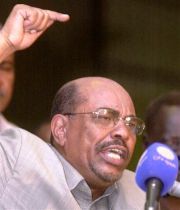Sudan president promises peace in Darfur
KHARTOUM, Jan 12 (Reuters) – Sudanese President Omar Hassan al-Bashir assured a cheering crowd on Wednesday he would bring complete peace to the entire country, including the troubled western region of Darfur.

|
|
Sudanese President Umar al-Bashir gestures during his speech in Khartoum, Sudan, Wednesday, Jan 12, 2005, where he pledged to bring peace to the war-torn Darfur region. (AP). |
“The peace … and the happiness is not complete because there is an issue in Darfur, there are displaced in Darfur, there are refugees from Darfur,” he shouted, his voice hoarse from the speeches he had given in the south over the past three days.
The northern government signed a deal on Sunday with the southern rebel Sudan People’s Liberation Movement (SPLM) to end Africa’s longest civil war, which has killed more than 2 million people and forced more than 4 million from their homes.
But the deal ending 21 years of fighting in the south does not cover the separate conflict in Darfur in the west of Sudan, which has killed tens of thousands and forced almost 2 million from their homes.
Bashir put Vice President Ali Osman Mohamed Taha, who helped negotiate the accord with the southern rebels, in charge of peace efforts in Darfur.
Addressing a crowd of about 3,000 in the ruling National Congress party headquarters, Bashir said: “As we delivered peace in the south, we will deliver peace in Darfur.”
At his words the crowd rose to their feet and the governor of North Darfur state, Osman Kebir, raised his hands in joy.
Bashir, a devout Muslim, told the crowd they should be thankful to God for peace. “Praise be to God — but it’s not enough just to say ‘Praise be to God’, because the peace needs work … and it needs patience,” he said.
He then left his podium, knelt down and touched his head to the ground in prayer.
“Just as we were patient in war and as we were patient in negotiations, we will be patient in peace,” he said.
The southern conflict broadly pitted the Islamist government in Khartoum against the mostly Christian, pagan south. It was complicated by issues of oil, ethnicity and ideology.
Under the peace agreement, the ruling National Congress party and the SPLM will form an interim coalition government, decentralize power, share oil revenues and integrate the military. In six years’ time the south can vote for secession.
Bashir praised Taha’s role in negotiating with the rebels.
“I will delegate him to bring peace to Darfur just like he did for the south,” he said.
The violence in Darfur began in early 2003 after years of tribal conflict over scarce resources. The rebels accuse the government of neglect and of using Arab militias to loot and burn non-Arab villages.
